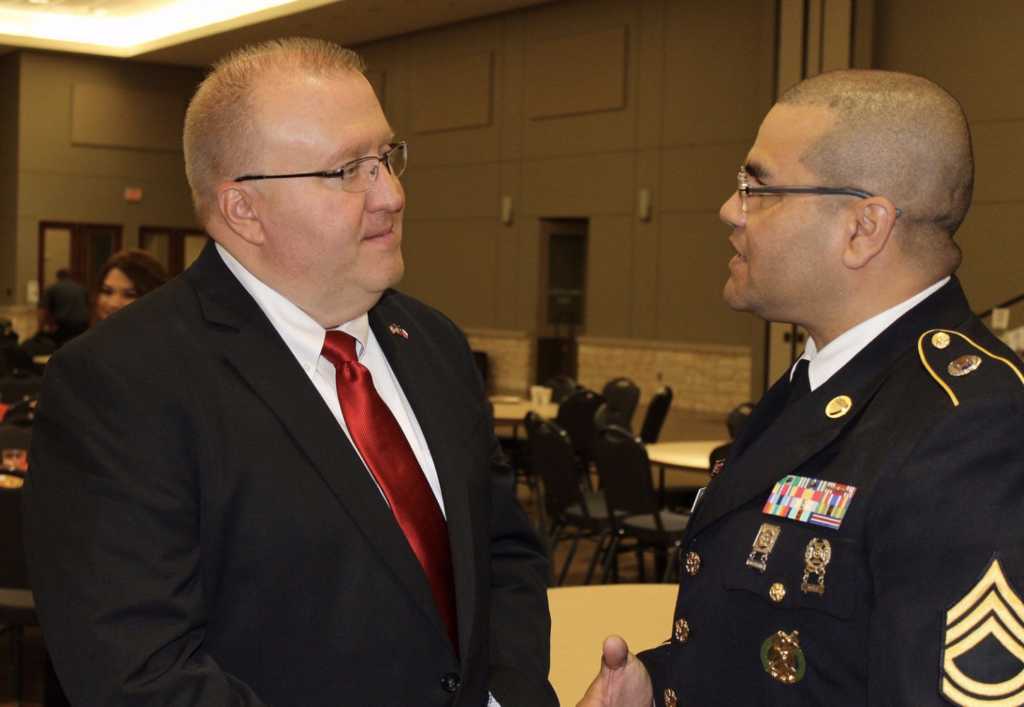An atheist activist group is suing a Texas justice of the peace, claiming that he unconstitutionally allows chaplains and guest pastors to pray before court sessions, calling the purported practice a violation of the First Amendment.
The lawsuit, filed on March 21 in the U.S. District Court for the Southern District of Texas by the Freedom From Religion Foundation and three unnamed plaintiffs, alleges that Montgomery County Judge Wayne Mack includes sectarian prayers in his courtroom.
The complaint follows a previous grievance letter in 2014 that requested that Mack stop invocations — a letter the organization said the judge didn’t respond to. What followed, though, was a 2015 complaint to the Texas State Commission on Judicial Conduct, which reportedly concluded with no official act of discipline against Mack.
That said, the justice of the peace did reportedly make some changes after that complaint, including having the bailiff introduce the impending prayer so that Mack, himself, wouldn’t see who chooses to opt out of sitting through invocations.
The complaint claims, though, that the doors to the court are then locked, forcing those who sit out to have to knock on the door and draw attention to themselves in order to come back into the room, according to the Freedom From the Religion Foundation.
But as atheists push back against the handling of prayer and voice concern that those who don’t partake will be punished by Mack via his handling of courtroom matters, First Liberty Institute, a conservative legal firm that defended Mack during the previous complaints, framed the situation in a different light:
As a Texas Justice of the Peace, Judge Mack is authorized to act as a coroner when a death occurs in Montgomery County. Several years ago, Judge Mack implemented a volunteer chaplaincy program for religious leaders of all faiths. When there is a death in the county, mourners may request a volunteer chaplain to come and comfort them according to their wishes and religious beliefs. In order to honor the volunteer chaplains’ work and to solemnize his courtroom proceedings, Judge Mack invites volunteer chaplains to open his court proceedings with a short prayer.
Even though the practice is protected under legal precedent and mirrors the tradition of both the Texas and United States Supreme Courts, the Freedom from Religion Foundation complained, resulting in the Texas State Commission on Judicial Conduct launching an investigation into Judge Mack’s practices. In October 2015, First Liberty Institute represented Judge Mack at a hearing before the Commission. Soon after, the Commission officially dismissed the complaint, but “strongly cautioned” Judge Mack to dismantle the chaplaincy program and end his practice of opening his court sessions in prayer. However, in August 2016, Texas Attorney General Ken Paxton issued an opinion affirming that Judge Mack’s practices are well within the bounds of Texas law and the Constitution.
Despite that affirmation, the Freedom From Religion Foundation and the three plaintiffs in particular are taking additional aim at the prayer practice, continuing their claim that Mack is acting illegally. The three unnamed plaintiffs, for instance, said they felt pressure to join in on the prayers, according to The Houston Chronicle.
“Ms. (Jane) Noe is an atheist. She does not believe in any supernatural higher power, and being subjected to religious prayer by a government official violates her sincerely held beliefs,” read the complaint.
Another plaintiff, referred to as Jane Doe, is a Christian and an attorney who has appeared before the judge four times, claiming that a government official shouldn’t be “telling her when or how to pray.” And the third and final plaintiff is John Roe, a religious-unaffiliated lawyer who opposes in-court invocations.
“Before Mack starts each of his court sessions, he introduces a ‘visiting pastor,’ outlining his credentials, advertising the church he is from and where it is located,” the Freedom From Religion Foundation said in a statement. “The guest chaplain often reads or sermonizes from the Christian Bible, then asks all attendees to bow their heads and pray. All prayers witnessed by the plaintiffs have been Christian in nature.”
The lawsuit contends that Mack’s courtroom prayer policy seeks to “advance religion in general, and Christianity specifically, through the machinery of the judiciary.” But First Liberty said that the Freedom From Religion Foundation has it wrong.
“Those arguments have been made before,” said attorney Hiram Sasser. “They’ve just sort of fallen on deaf ears.”
Either way, the atheist group is hoping the federal court will step in to stop the invocations. It is unclear what will unfold next. While the Supreme Court has in the past validated prayer at public meetings, some critics say that the courtroom is an entirely different scenario and might not be covered by those previous cases.
—
Other Must-Read Stories:
– Ex-Felon Who Found God Saves Cop’s Life Amid Brutal Beating — and Just in the Nick of Time
– Baby Born With 4 Legs and 2 Spines Doing Well After Coming to U.S. for Risky Surgery
– Christians Once Dominated Hollywood: The Fascinating Movie-Making History You Likely Didn’t Know



